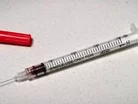'Lab in a chip' card to revolutionise blood tests

Researchers have developed an innovative new blood testing method which experts believe could transform and streamline blood testing practices across the world.
A team from Columbia University in New York have come up with the mChip, a cheap and portable piece of equipment which gives test results in just a few minutes.
Studies of the mChip have found that the clear credit-card looking device can diagnose illnesses such as HIV and syphilis with a rate of almost 100 percent accuracy.
READ MORE FROM THE WDM CONTENT NETWORK:
To read the latest edition of Healthcare Global, click here
- Low wage and poor diet speeds up aging
- Testing begins on wonder breast cancer drug
- New discovery is being dubbed as a ‘super antibody’
Key to the tool is the microchip, which holds miniature forms of test tubes and chemicals and works with only a tiny finger-prick amount of blood.
The developers have given the chip a projected cost of US$1, making it much cheaper than the current blood tests that are available and ideal for use in third world countries.
Meanwhile, the study found the blood test performed well in environments where there was little in the way of a healthcare infrastructure or medical training.
The new technology also shortened the turnaround time of blood tests. In Rwanda people usually have to wait weeks for test results, but the mChip can give a diagnosis in 20 minutes.
A prototype of the mChip was used to test hundreds of people in Rwanda as part of the study.
Results showed the device had a rate of 95 percent accuracy for diagnosing HIV and 76 percent accuracy for diagnosing syphilis.
Samuel Sia, one of the lead mChip developers, now hopes to use the method to increase testing of sexually transmitted diseases (STDs) in pregnant women across Africa.
He said: “The idea is to make a large class of diagnostic tests accessible to patients in any setting in the world, rather than forcing them to go to a clinic to draw blood and then wait days for their results.”
“Diagnosis of infectious diseases is very important in the developing world,” Sia added.
“When you're in these villages, you may have the drugs for many STDs, but you don't know who to give treatments to, so the challenge really comes down to diagnostics.”
